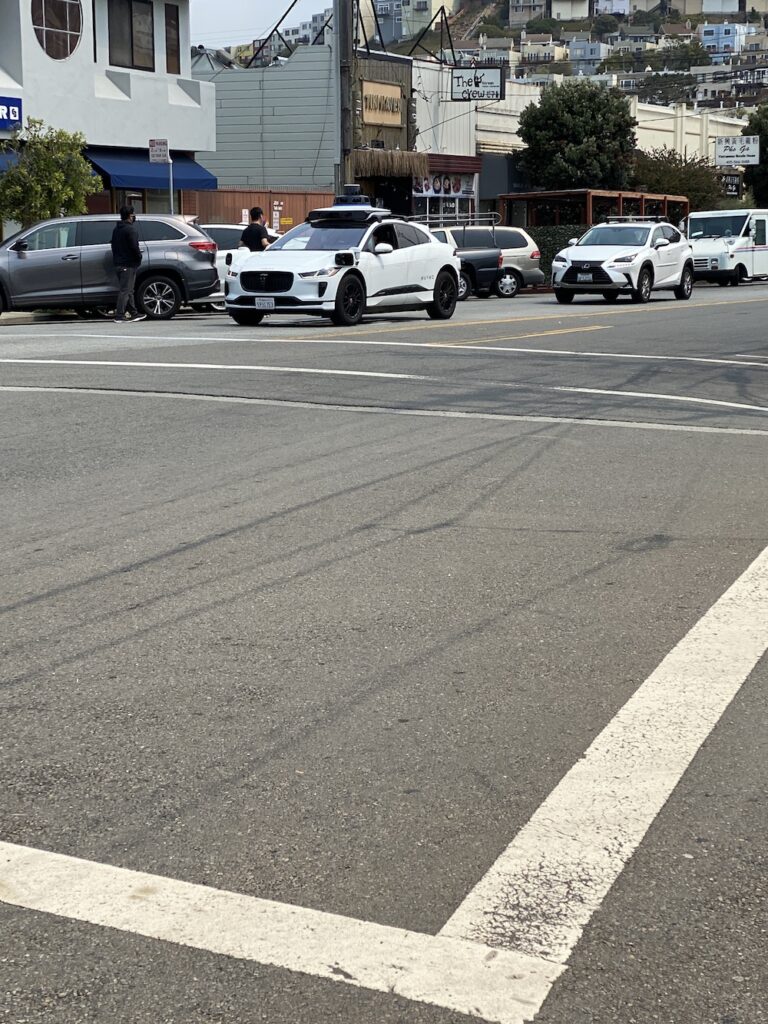Item 23 on this week’s Board of Supes meeting looks like the sort of routine stuff the board deals with all the time: An appeal of a conditional use permit that would allow Waymo to convert 21,000 feet of an existing warehouse space to employee parking.
But behind that is a much, much bigger story, one that the city—and the nation—are going to have to deal with fairly soon.

What’s really going on here, Mark Gleason, a retired Teamster official, told me, is that Waymo is preparing to set up a hub for driverless parcel delivery vehicles.
It’s already starting: Another hub on Pine and Franklin is sending 200 vehicles an hour out onto the streets, Teamster research shows.
What this means, of course, is that a sizable number of the perhaps 20,000 unionized delivery drivers in Northern California will ultimately be out of a job.
That’s what Waymo, and Uber, and Amazon, the rest of the Big Tech world, wants: Taxis and buses and local deliveries and even long-haul trucks that don’t require the companies to pay drivers (much less to pay their drivers union wages).
“This thing has been presented incorrectly,” Gleason told me. “It’s a ruse to let them use robot parcel deliveries.”
The Planning Department disagrees: The permit, planners say, would only allow non-commercial employee parking for and existing Waymo maintenance facility down the block, at 2021 Toland:
As distinct uses, any authorization to establish a Private Parking Garage Use does not permit the unloading, sorting, and reloading of local retail merchandise for deliveries at a project site. Conversely, any authorization to establish a Parcel Delivery Use does not permit temporary parking of personal vehicles for private use.
But we have seen, over and over again, in hundreds of cases, corporations and developers getting permits for one type of use, then blatantly going about a different use, while Planning looks the other way.
San Francisco has been very bad at regulating technology; the city let’s tech companies break all the rules, then retroactively ask for permission. That’s the Big Tech mindset: Move fast and break things. Never mind the impacts on the rest of society.
So this could be just the latest—a parking garage that becomes a hub for robot deliveries. (Companies in SF are already testing robot sidewalk deliveries and soon we will see drone deliveries. What could possibly go wrong?)
But let’s just pause for a moment and talk about the much, much larger problem.
Roughly 5 million people in the United States make their living as truck or delivery drivers. Most of them are men, and many of them are over 50. Fewer than ten percent have a college degree. An increasing number, according to the US Census, are women and Latinx.
For unionized workers, it’s a tough job but it pays a living wage. For non-union drivers (and increasingly, gig drivers) it’s even tougher, and many are barely making it.
What happens when all of those jobs are taken over by robots?
That’s the future that Uber and Amazon and Waymo and the rest are preparing for, and maybe it’s inevitable. But throwing five million people out of work, many of whom have built their lives around a middle-class income and have no other immediate skills that translate into a decent job, is a pretty serious social issue.
The US is utterly unprepared for this.
In fact, the US is utterly unprepared for the massive workforce transformations that explosive changes in technology are about to unleash.
Previous industrial revolutions have not gone so well for workers, and have created huge disruptions in the social and economic fabric.
It doesn’t have to be this way: If we as a society decide that the vast wealth created by new technology has to be shared with everyone instead of going to the top one-tenth of one percent, we could offer all the older truck drivers (who don’t want to flip burgers or be “retrained” for the “jobs of the future”) a dignified early retirement at union wages, for life. (That would take only a small portion of Jeff Bezos’ wealth). We could make guaranteed income a thing for everyone displaced by robots.
We could (shocking!) decide that your income and standard of living isn’t entirely connected to your employment. We could do this next industrial revolution right.
But right now, nobody in politics is even discussing the idea.
I know: It goes way beyond Waymo and 301 Toland. But it’s something we all need to be talking about, starting yesterday.
That hearing starts at 3pm Tuesday/23.
Sup. Aaron Peskin vowed a few weeks ago to force Mayor London Breed to come to United Nations Plaza and explain how she is dealing with the crises of homelessness and drug overdoses on the streets.
He’s making that happen: Question Time at the Tuesday/23 Board of Supes meeting will happen at UN Plaza.
Now: The mayor’s security people will be sure to clear the area of anyone who might seem to be disturbing.
But it’s a chance to challenge the deep media narrative, which exempts the mayor from any responsibility for problems on the streets and blames the progressive sups for everything.
(The media used to blame Chesa Boudin, but he’s out of office, so now it’s the supes.)
This is going to be a defining factor in the 2024 elections, when Big Tech and Real Estate is going to attack the progressives with millions of dollars.
I will be fascinated to see how the media covers it.







